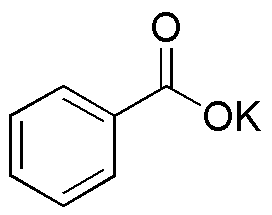Potassium benzoate is widely utilized in research focused on:
- Food Preservation: Commonly used as a food additive, it helps prevent spoilage by inhibiting the growth of mold, yeast, and some bacteria, making it ideal for products like sauces and beverages.
- Pharmaceuticals: Employed as a preservative in various medications, it enhances shelf life and maintains the efficacy of active ingredients, ensuring patient safety and product reliability.
- Cosmetics: Utilized in personal care products, it acts as a preservative and pH adjuster, contributing to product stability and safety in items like lotions and creams.
- Industrial Applications: Used in the manufacturing of plastics and dyes, it serves as a key ingredient in processes that require stable and effective chemical reactions.
- Research and Development: In laboratory settings, it is often used as a standard in analytical chemistry for calibrating instruments and validating methods due to its known properties.
General Information
Properties
Safety and Regulations
Applications
Potassium benzoate is widely utilized in research focused on:
- Food Preservation: Commonly used as a food additive, it helps prevent spoilage by inhibiting the growth of mold, yeast, and some bacteria, making it ideal for products like sauces and beverages.
- Pharmaceuticals: Employed as a preservative in various medications, it enhances shelf life and maintains the efficacy of active ingredients, ensuring patient safety and product reliability.
- Cosmetics: Utilized in personal care products, it acts as a preservative and pH adjuster, contributing to product stability and safety in items like lotions and creams.
- Industrial Applications: Used in the manufacturing of plastics and dyes, it serves as a key ingredient in processes that require stable and effective chemical reactions.
- Research and Development: In laboratory settings, it is often used as a standard in analytical chemistry for calibrating instruments and validating methods due to its known properties.
Documents
Safety Data Sheets (SDS)
The SDS provides comprehensive safety information on handling, storage, and disposal of the product.
Product Specification (PS)
The PS provides a comprehensive breakdown of the product’s properties, including chemical composition, physical state, purity, and storage requirements. It also details acceptable quality ranges and the product's intended applications.
Certificates of Analysis (COA)
Search for Certificates of Analysis (COA) by entering the products Lot Number. Lot and Batch Numbers can be found on a product’s label following the words ‘Lot’ or ‘Batch’.
*Catalog Number
*Lot Number
Certificates Of Origin (COO)
This COO confirms the country where the product was manufactured, and also details the materials and components used in it and whether it is derived from natural, synthetic, or other specific sources. This certificate may be required for customs, trade, and regulatory compliance.
*Catalog Number
*Lot Number
Safety Data Sheets (SDS)
The SDS provides comprehensive safety information on handling, storage, and disposal of the product.
DownloadProduct Specification (PS)
The PS provides a comprehensive breakdown of the product’s properties, including chemical composition, physical state, purity, and storage requirements. It also details acceptable quality ranges and the product's intended applications.
DownloadCertificates of Analysis (COA)
Search for Certificates of Analysis (COA) by entering the products Lot Number. Lot and Batch Numbers can be found on a product’s label following the words ‘Lot’ or ‘Batch’.
*Catalog Number
*Lot Number
Certificates Of Origin (COO)
This COO confirms the country where the product was manufactured, and also details the materials and components used in it and whether it is derived from natural, synthetic, or other specific sources. This certificate may be required for customs, trade, and regulatory compliance.


